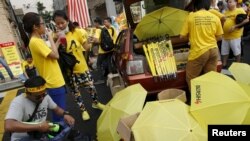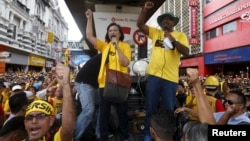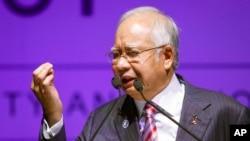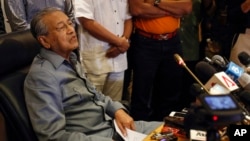A leading Malaysian campaign for political and electoral reform is pressing ahead with a major rally this month despite pressure from the government and threats and violence against rally supporters.
Maria Chin, chairperson of the Bersih 2.0, a coalition calling for for free and fair elections in Malaysia, says the campaign has included a nationwide convoy launched on October 1 to promote the rally and calls for reform ahead of November 19.
But several violent incidents have marred the Bersih convoy with attacks and scuffles on supporters by so-called pro-Malay "red shirts."
Violent incidents
Maria Chin along with Ambiga Sreenevasan, president of the National Human Rights Society and Mandeep Singh, a staff member of Bersih, all received death threats in October.
Later, a car of one of Chin’s children was splashed with red paint and chicken blood.
But Chin, in an interview with VOA, dismissed the threats and called on Malaysian police to maintain law and order.
“It’s not a question of my personal safety, it’s a question of the safety of the Bersih supporters — it’s not just about me. The police will have to handle the red shirts who may or may not come. We will leave it to the police. As for the rally it will still go on and it will be on the 19th of November,” she said.
Chin also dismissed a claim by Malaysian Deputy Prime Minister Amad Zahid Hamidi, who said Bersih was not permitted to stage the rally as it was not a society registered with the Registrar of Societies.
Red shirts opposed to reform movement
A key leader of the red shirt movement, Jamal Mohamad Yunos, a state leader with the governing United Malays National Organization (UMNO), was briefly detained after attacks on the convoys.
Since then Yunos is reported to have threatened to mobilize 300,000 red shirts to prevent the Bersih rally from going ahead.
Several rights groups, under the banner Asia Democracy Network (ADN), released a statement calling on the government to “take immediate and effective measures to stop the violent aggression and incitement of violence perpetrated by the red shirts”.
On Tuesday, red shirt leaders offered to “provide security” for the rally if it was relocated indoors.
Bersih convoy, a coalition of many groups
Bersih, founded in 2006, brings together a coalition of 62 non-government organizations (NGOs) calling for reform to Malaysia’s electoral system.
Chin said pressuring the government to make changes remained a major challenge.
“They know what we are talking about and that’s why they are reacting in this violent manner. So definitely they know what we are talking about. Whether it will happen or not to be honest will take some time. Change doesn’t happen just because we go in the streets,” she said.
The Bersih convoy has called for institutional reforms for a "new Malaysia” covering elections, governance, a strengthening of parliamentary democracy and empowering the states of Sabah and Sarawak.
The pro-Malay red shirt leaders have also attacked reporting by independent online news site Malaysiakini.
Rights group Amnesty International said around 100 red shirt supporters rallied outside the paper’s offices on November 3, chanting slogans and threats to attack the building.
Analysts say the clashes and threats against the rally and media outlets have raised fears of violence at the November 19 rally.
Phil Robertson, deputy Asia director for the New York-based Human Rights Watch, said Malaysian authorities need to ensure the public safety of those attending the rally.
Right of assembly
“The core of this is the right to peaceful public assembly. And the Bersih people have shown time and time again that this is a peaceful movement that people are exercising their human rights,” Robertson said.
“For the Government to try to say that you can’t have the rally because it might be a problem, I think is clearly overkill and clearly an infringement on the human rights of people who have something to say and are demanding to say that publicly,” he said.
Robertson says the key concerns are of possible violence and force by security personnel, including use of tear gas and water cannons, which they used to disperse a Bersih rally of more than 100,000 in April 2012.
“It’s entirely possible that we will see a major, major problem on November 19,” he said.
Political tensions in Malaysia have been rising especially since Prime Minister Najib Razak, faced accusations of diverting over $3.5 billion from the 1 Malaysia Development Berhad (1MDB) fund.
Allegations against prime minister
Najib claims he is innocent, saying the funds were dealt with properly and were a “genuine donation” from Saudi Arabia.
But international investigations have followed, including by the United States Department of Justice and authorities in Singapore, of funds being used inappropriately.
Other challenges include the recent formation of a new political party, led by former members of UMNO including a former Prime Minister Mahathir Mohammad, who stepped down 2003 after more than two decades in power.
Bersih has called for Najib to resign and pave the way for independent investigations over the corruption charges.
But analysts say the position of Najib, fresh from an official visit to China with $34 billion in business deals, remains secure, with the new investment expected to underpin Malaysia’s economy ahead of new elections slated for 2018.








